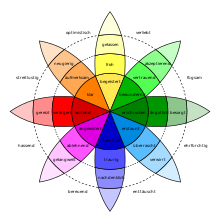Emotion
![]()
The title of this article is ambiguous. For other meanings, see Emotion (disambiguation).
Emotion or movement of mind refers to a psychophysical movement that is triggered by the conscious or unconscious perception of an event or situation.
Emotion or affect is to be distinguished from feeling or sensation as an emotion. Feeling is the more general term, and includes a wide variety of mental experiences, such as jealousy, pride, insecurity, enthusiasm, and melancholy. In contrast, the term "great feeling" has come to be used as an emotion, designating a clearly perceptible physical change in musculature, heartbeat, breathing, etc., which can be detected with measurements of neurophysiological parameters.
It is still disputed among scientists whether there are patterns of physiological changes that allow an unambiguous diagnosis of an emotion. Meanwhile, several researchers speak of "basic emotions" to denote that there are very well basic whole-body programs (brain-physiological, hormonal, muscular).
One emotion
- is behaviorally controlling,
- varies in degree with the importance of the situation,
- consists of a specific physical activation that serves to adapt to the situation,
- is located primarily in the limbic system,
- is felt primarily as muscle activity,
- is measurable in the release of various neurotransmitters (serotonin, adrenaline, oxytocin, etc.),
- can be consciously perceived and, unlike affect, can be influenced.
Emotionality and the adjective emotional are collective terms for individual peculiarities of emotional life, affect control and the handling of an emotion.

Robert Plutchik's Wheel of Emotion
Etymology
The foreign word emotion denotes a feeling, a movement of the mind and mental excitement. The German word is borrowed from the French word émotion, which is synonymous with émouvoir (i.e. to move, excite). This word derives from the Latin emovere (Eng. to move out, to stir up), which is also contained in the word locomotive. For the linguistic expression of emotions, the Swiss philosopher Anton Marty coined the term emotive (Latin e-motus for German herausbewegt, erschüttert). These include, for example, an exclamation, a wish or a command sentence.
Delimitations
There is no precise scientific definition for the term "emotion". On the one hand, philosophy and psychology strive for the term, on the other hand also the neurosciences. The neurosciences deal with the efferent somatic and vegetative reactions of an organism to emotions, while otherwise the affective aspects are in the foreground, negative or positive states from fear and anxiety to love and happiness.
In contrast to feelings, emotions as an affect - seen from the acting individual - are usually directed outwards. In German, the term affect refers to a short-term emotional reaction often accompanied by a loss of control over action. Despite the arousal, an emotional reaction retains the substance of a course of action.
Compared to moods, emotions are relatively short and intense in time. While moods are often based unnoticed on needs, with emotions the respective triggers come more strongly into play. While emotions can relate to persons, for example anger or sadness, a mood can completely lack a reference to persons, as in the case of melancholy.
Likewise, feelings, emotions, moods are a part of interpersonal communication, but also of non-verbal communication. In perception, they accompany cognition, e.g. in feeling evidence. Intuition, which initially lacks steps of cognition, is also essentially based on a feeling or emotional grasp.
Questions and Answers
Q: What are emotions?
A: Emotions are what people feel. They are a complex mixture of hormones and the unconscious mind that cause mammals to change behaviour according to changes in their situation.
Q: How can we control our emotions?
A: We can only control our emotions with great difficulty by conscious effort.
Q: What is a scientific definition of emotion?
A: A scientific definition of emotion needs to include three things; conscious experience (feelings), expressions which can be seen by others, and actions of the body ('physiological arousal'). One example definition is "Emotion is a complex psychological phenomenon which occurs as animals or people live their lives. Emotions involve physiological arousal, appraisal of the situation, expressive behaviours, and conscious experience. Emotion is associated with feeling, mood, temperament, personality, disposition, and motivation".
Q: What physical systems are involved in emotions?
A: The physical systems involved in emotions involve the hormone system, autonomic nervous system and 'lower' brain centres (hindbrain and midbrain).
Q: Are emotions ancient?
A: Yes, emotions are very ancient and can be seen in all mammals.
Q: Do different experts have different definitions for emotion?
A: Yes, over 90 definitions have been offered by experts for emotion.
Q: Is it possible to live life logically despite emotional responses? A: It can be difficult as sometimes our emotional responses run against our attempt to live life logically.
Search within the encyclopedia